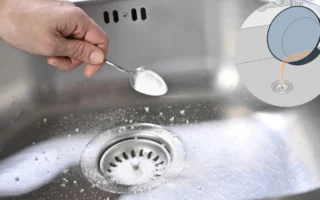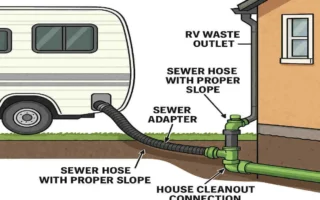Imagine waking up on a frigid winter morning, only to find your furnace sputtering or your stove flame flickering weakly. It’s a scenario that makes many homeowners pause and wonder: can gas lines freeze in a house? Gas lines are the unsung heroes of our homes, quietly delivering the fuel that keeps us warm, cooks our meals, and powers our daily lives. Without them, modern comfort would grind to a halt.
But here’s the thing—cold weather can bring unexpected worries. You’ve probably heard stories about frozen water pipes bursting, but what about gas lines? It’s a common concern, especially in regions with harsh winters.
Think about your own setup for a moment. Do you rely on natural gas or propane? Understanding these basics can make all the difference. Stick with me as we unpack this step by step—it’s easier than you might think, and it could save you from a chilly disaster.
What Are Gas Lines and How Do They Work?

Gas lines might seem mysterious, but they’re really just the pipelines that bring fuel right to your doorstep. In most homes, these lines connect to a main supply from the street or a tank, weaving through walls and floors to reach appliances like your heater, water boiler, or oven. They’re designed to be sturdy and reliable, but like anything, they need a little TLC.
Let’s break it down. Picture gas lines as the veins in your home’s energy system. They carry gas under pressure, ensuring it flows smoothly to where it’s needed. Without them, you’d be stuck with electric alternatives, which aren’t always as efficient for heating.
Types of Gases Commonly Used
Most households use either natural gas or propane. Natural gas is the go-to for city dwellers—it’s piped in from underground lines and is mostly methane, making it clean-burning and cost-effective. Propane, on the other hand, comes in tanks and is popular in rural areas. It’s a bit denser and works well for off-grid setups.
Have you checked what type of home your home uses? Knowing this helps when we talk about freezing risks later. Both are gases at room temperature, but they behave differently in the cold.
Basic Function and Flow of Gas in Household Lines
Here’s how it works: Gas enters your home through a meter that tracks usage. From there, it travels through metal or flexible pipes to your appliances. A regulator controls the pressure, stepping it down from high street levels to something safe for your stove or furnace.
It’s all about steady flow. When you turn on your heater, a valve opens, and gas mixes with air for combustion. Simple, right? But if something disrupts that flow—like extreme cold—you might start asking, can gas lines freeze in a house? We’ll get to that soon.
Understanding the Freezing Point and Conditions of Gas Lines

Freezing sounds straightforward, but for gas lines, it’s not about the gas turning into ice cubes. Instead, it’s often about blockages that mimic freezing. Think of it as a traffic jam in your pipes, caused by cold temps turning any moisture inside into ice.
Gas itself has a super low freezing point—way below what we’d see in a modern home. But conditions like humidity and pressure can change the game. Let’s unpack this so you can see why it’s not as scary as it sounds.
Define Freezing and What It Means for Gas Lines
In simple terms, freezing here means ice forming inside or around the pipes, blocking gas flow. It’s not the gas freezing solid; it’s usually water vapor or condensation turning into ice. This can happen if pipes get too cold, leading to restricted supply.
Does this happen often? Not really, but it’s worth knowing the basics to stay ahead.
Address the Physical Properties of Natural Gas and Propane
Natural gas freezes at around -260°F (-162°C), which is insanely cold—think Arctic research station levels. Propane’s freezing point is about -306°F (-188°C). In your luxury house, even during a deep freeze, temps don’t dip that low.
So, why the worry? It’s because these gases can carry tiny amounts of water vapor. In extreme cold, that vapor can condense and freeze, creating problems. Propane is more prone to this due to its storage in tanks, where moisture might sneak in.
Why Gas Itself Does Not Freeze in Typical Household Conditions
Let’s be clear: In a standard home, your gas won’t freeze. Homes are heated, and pipes are insulated. The real issue is external factors like unheated garages or crawl spaces where pipes run exposed.
Picture this: Your basement drops to 20°F overnight. The gas keeps flowing, but any dampness inside could ice up. That’s the key—it’s not the gas, it’s the extras.
Factors That Influence Freezing Risk in Gas Lines
Temperature is the big one, but moisture, pressure drops, and poor maintenance play roles too. High humidity means more water vapor in the system. Low pressure can cause condensation.
Ask yourself: Is your home in a cold climate? Do you have exposed pipes? These factors amp up the risk, making it smart to prepare.
Can Gas Lines Freeze in a House? The Science Behind It

Now, the million-dollar question: Can gas lines freeze in a house? The short answer is yes, but it’s rare and usually involves moisture, not the gas itself. Let’s dive into the science without getting too technical—I’ll keep it straightforward.
Gas lines are built tough, but they’re not invincible. In most cases, indoor lines stay warm enough to avoid issues. But science shows us where vulnerabilities lie.
Explain the Role of Moisture and Condensation in Pipe Freezing
Moisture is the villain here. Gas from suppliers is dry, but tiny leaks or humid air can introduce water vapor. When temperatures plummet, that vapor condenses into liquid, then freezes into ice.
It’s like dew on a cold window turning to frost. Inside pipes, this ice expands and blocks the flow. Ever seen frost on your fridge coils? Same idea.
Discuss the Possibility of Water Vapor in Gas Lines Causing Freeze Blockages
Water vapor sneaks in during installation, repairs, or from the gas supply itself if not properly dried. In propane systems, tanks can collect condensation over time.
In a house, this might happen in unheated attics or outdoor lines. The blockage acts like a frozen plug, stopping gas from reaching your furnace. Scary, but preventable.
Clarify Myths vs Facts Regarding Frozen Gas Lines Indoors
Myth: Gas lines freeze just like water pipes. Fact: Water pipes freeze because they’re full of liquid; gas lines are gaseous, so it’s the moisture that causes the freeze.
Another myth: All homes are at risk. Fact: Well-insulated, heated homes rarely face this. Indoors, it’s uncommon unless pipes run through cold spots.
Exceptional Cases in Colder Climates or Unheated Spaces Inside the House
In places like Minnesota or Alaska, where gas lines can freeze in a house, it becomes a genuine concern. Unheated garages or basements pipes to sub-zero temperatures.
For example, if your gas line runs through a drafty crawl space, moisture can freeze there. I’ve heard stories from homeowners who ignored this and ended up with no heat mid-winter. Don’t let that be you—check those areas now.
Common Causes of Gas Line Freezing

Freezing doesn’t happen out of nowhere. Several culprits team up to create blockages. Understanding them helps you spot risks early.
Let’s look at the main ones. By addressing these, you can keep your system running smoothly.
Moisture or Water in the Gas Line System
Water is enemy number one. It enters through tiny cracks, poor seals, or even from the gas provider. Once inside, cold temps turn it to ice.
Prevent it by ensuring your system is dry during installations. Regular checks catch this early.
Exposure of Gas Pipes to Extreme Cold or Drafts Inside Unheated Areas
Pipes in garages, attics, or exterior walls face the brunt of winter. Drafts let cold air in, chilling the metal and any moisture inside.
Insulate those spots—it’s a game-changer. Have you inspected your unheated areas lately?
Poor Insulation or Damaged Pipe Covering
Old or torn insulation lets cold seep in. Over time, coverings wear out, exposing pipes.
Replace damaged insulation promptly. It’s like putting a warm coat on your pipes.
Furnace or Gas Appliance Issues Leading to Condensation Build-Up
A faulty furnace can cause backflow or uneven heating, leading to condensation. Dirty filters or vents exacerbate this.
Keep appliances tuned up. A little maintenance goes a long way.




